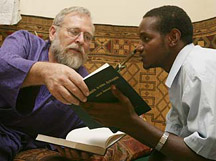Posted: 7/06/07
|
| Southern Baptist Missionary Scott Bradford joins a friend for a traditional African tea ceremony known as “warga.” The two-hour ceremony takes places three times a day and consists of three rounds of tea, each progressively sweeter than the last. Short-term volunteer trips cannot take the place of this kind of “incarnational” presence by career missionaries, according to Ed Stetzer, director of LifeWay Research. (IMB Photo) |
What is the future of missions?
By Ken Camp
Managing Editor
As churches and individual Christians demand more hands-on, practical connection to missions, some Baptists are questioning whether a missions-by-proxy approach—churches supporting professional career missionaries sent by large denominational agencies— has a future.
Count Ken Hall, president of Buckner International, among them.
Granted, God uses “imperfect instruments” to accomplish his work, and he blesses a variety of approaches to accomplish his mission—including big denominational bureaucracies, Hall said. But he generally doubts the wisdom of missions agencies sending cross-cultural career missionaries internationally as “surrogates” for other Christians.
“Is it the best use of our resources to train a handful of professionals to go in our place?” he asked.
For most of Christian history, the gospel spread across boundaries naturally as Christ’s followers shared their faith “in the normal course of life,” when their vocations took them to new places, he said. The Apostle Paul—usually cited as the model missionary—worked as a tentmaker and went on a series of relatively short-term missionary journeys.
“Career missionaries—by and large—are the exception to the biblical model, not the norm,” Hall said.
Mobilizing all Christians
Rather than delegating the missionary role to a relative handful of professionals supported by a denominational bureaucracy, churches could spread the gospel more effectively by engaging all of their members in a variety of local, national and international missions opportunities, he stressed.
“Our resources would be better spent mobilizing 30 million missionaries rather than supporting 4,000 or 5,000,” Hall said.
Sending cross-cultural career missionaries involves training, supervision and ongoing financial support for a proportionately small number of people, creating a system with a large overhead, he added.
“Too often, our missions emphasis has been more about raising money for the missionaries than raising money for missions,” Hall said.
 |
| Elena Korepanova, a Russian national who serves as follow-up team member for Buckner, plays with a child in Orphanage No. 15 during Vacation Bible School. (Buckner photo) |
But missions work performed almost exclusively by short-term volunteers also has its down side, said missiologist Ed Stetzer, director of research for LifeWay Christian Resources.
“I praise God for the volunteer mission work that is taking place, but if we’re not careful, it can be a double-edged sword,” Stetzer warned. “Too often, it turns into tourist missions and not genuine mission engagement.”
In many parts of the world, nothing can take the place of missionaries who make a lifetime commitment to a particular place or people group, he insisted.
“The reality is that in much of global missions, often engagement takes long-term incarnational missionaries living in context, understanding the language and culture, and planting biblical churches. You can’t do that when you have to go home on Thursday,” he said.
Church-based missions
Rob Nash, coordinator of Cooperative Baptist Fellowship Global Missions, and Bill Tinsley, leader of the WorldconneX missions network launched by the Baptist General Convention of Texas, agree the missions task is too big to be left only to career missionaries. But they remain convinced career missionaries continue to play an important role.
“Missions is primarily God’s work and only secondarily our work. It is not a calling that is restricted to a particular and select group of people. It is the task of the whole church and the calling of every single Christian person in the world,” Nash said.
Instead of “outsourcing” missions to an agency, many churches are beginning to reclaim their central role in global missions engagement, he stressed.
 |
| Claudia Leon, a Peruvian national and missions coordinator for Buckner Peru, places a pair of shoes on an orphan’s feet in Lima, part of Buckner International’s Shoes for Orphan Souls mission trip. Buckner employs indigenous Christian nationals as field personnel for their international ministries. (Buckner Photo) |
“Churches should no longer be satisfied to be peripheral to the denominational engagement. Rather, they should insist on taking their rightful place at the very center and core of that engagement,” he said. “This is the pattern Christ intended from the earliest days of the church.”
Tinsley echoed that sentiment, saying, “Effective systems for the 21st century have to enhance and strengthen church-based missions.”
“In the 21st century, every believer is a missionary, and every church is a missionary,” he continued. “We can no longer delegate the missions task to someone else or another organization. We must become involved, both locally and globally.”
Role of career missionaries
That doesn’t mean the end of career missionaries, Nash explained.
“We must have people from congregations in the United States who are committed to living cross-culturally and to committing themselves to a place—either in the U.S. or abroad—for a lifetime,” he said.
The role of the professional career missionary must change, Tinsley stressed.
“Career missionaries in the 21st century must be missions strategists, cross-cultural strategists, cross-cultural specialists and equippers,” he said. “As we continue to discover that every believer is a missionary, we will increasingly need those who can train, teach and equip others for effective service in various cultural settings.”
Clyde Meador, executive vice president of the Southern Baptist Convention International Mission Board also emphasized career missionaries will continue to play a vital role in world evangelization. And he echoed Tinsley’s emphasis on their task as equippers and trainers.
“Cross-cultural missionaries are essential to take the gospel to places where it is not yet, or where there are not yet enough local believers to continue the spread of the gospel,” Meador said.
“At the same time, a major responsibility of every cross-cultural missionary is to train and equip local believers to reach their own people, as well as to go to near-culture groups whom they might best reach. No people group will be evangelized to a great extent by outsiders, but rather by those within that people, who are evangelized and then equipped to reach their people.”
Likewise, Stetzer stressed the continuing impor tance of career missionaries, and he rejected the idea that Christians must choose between either supporting a denominational missions agency or being involved in direct, hands-on missions.
Both the IMB and the Southern Baptist North American Mission Board, where Stetzer served until recently as director of the Center for Missional Research, “realize they exist to help churches accomplish the Great Commission,” he said. “Thus, they support church planters and missionaries … but also help local churches personally engage in church planting and people group ministry in North America and around the world.”
BGCT President Steve Vernon believes there “will always need to be some kind of mission-sending agency,” but he thinks the roles of those agencies will change in the future. Vernon recently assembled representatives from BGCT-related institutions and agencies, along with Executive Board staff who have missions assignments for a “missions exchange” event to explore ways to coordinate their efforts.
“There will need to be some missionaries on the field to support the mission activities of churches as they wish to travel,” Vernon said. “Those missionaries may be indigenous missionaries or people from missions agencies sent out to serve.”
 |
| Missionary Warren Hessling shares with a young Tuareg man in Niamey, Niger. As a Southern Baptist International Mission Board strategy coordinator, Warren is responsible for helping direct work to bring the gospel to the Tuareg people. (IMB photo) |
Indigenous church leaders
Based on Buckner’s experience, Hall stressed the importance of Western Christians working as servants alongside national Christians in developing nations—not as outsiders who believe they have all the answers.
In some places, cross-cultural missionaries still may be needed, he conceded. But generally, instead of training Christians to invest their lives in a foreign culture, available funds could be spent better by helping indigenous, national Christians who already know the language and culture, Hall suggested.
Those nationals, in turn, can facilitate the work of short-term missions teams mobilized by their own churches, in partnership with ministries that have international connections.
That model works for Buck-ner because modern technology allows instant communication between administrators and the international field staff in eight countries, and—more to the point—because Buckner trusts Christians overseas to have the best understanding of their own culture and its needs, he noted.
“I think that a lot of models out there that rely on U.S. missionaries to take the message to other people groups have adopted that model because they don’t trust the Christians already there to get the message across,” Hall wrote in a blog earlier this year. “They can.”
The European Baptist Federation’s Indigenous Missionary Project offers another model, focused on helping Christians plant churches in their native countries. The project—supported financially by the BGCT, CBF and Baptist General Association of Virginia, American Baptists and many of the Baptist unions in Europe—provides initial support for each church starter for five years on a gradually diminishing scale, with the expectation that after that start-up period, outside support will be replaced by local funding. Currently, the project involves 65 church planters in 24 countries.
“We are not a sending agency,” said Daniel Trusiewicz, partnership coordinator for the project. “We always involve people who are local, who know the language, who know the culture and who are recommended by local Baptist unions or churches or associations. … Our role is to facilitate—to help them. … Some may be tentmakers—or have some other work—and our support allows them to focus on church planting.”
Cross-cultural missionaries may have an appropriate role, but church starting is not it, Trusiewicz insisted.
“If we speak about church planting, it has to be done by indigenous people, because they are the most effective and the cheapest. Some ministry (in other countries) may be done by expatriate missionaries, but not church planting,” he said.
Collaboration, not control
Sometimes, working with Christian nationals means crossing denominational lines, Hall noted.
“It’s not about indoctrinating people. It can’t be about control,” he said.
Nash likewise emphasized the importance of partnership and networking.
“This is a truly exciting time to be engaged with God all over the world. It is also a time in which we need to make sure that the focus is on God’s kingdom in the world and not upon any particular agencies, churches or other kinds of institutions,” he said. “True collaboration is essential. We have the opportunity together to truly share the gospel of Jesus Christ with the world. No one can own it. The work is God’s. The pattern for engagement will be God’s pattern.
“What is being shaped is a congregationally based and networking approach to global missions that just may be the greatest revolution in Christian history, because it occurs at a time when the world is smaller and when we are finally coming to grips with the obligation that every Christian has to be a missionary.”
Collaboration means recognizing the center of Christianity is shifting from the Western and Northern Hemisphere to the South and the East, Tinsley added.
Denominational missions-sending agencies “must create collaborative efforts with non-Western Christian leaders and multiple missions agencies. They must integrate church-based sending and participation into their strategies. (Western Christians) are no longer the only players—or even the dominant players—on the field.”
A missions model centered on national Christian leaders working with short-term volunteers from other cultures demands flexibility, Hall added.
“When you’re working with volunteers, it’s messy—just like church,” he acknowledged. But, he stressed, God gave the task of expanding his kingdom to churches—not denominations.
With additional reporting by Robert Dilday of the Virginia Religious Herald
News of religion, faith, missions, Bible study and Christian ministry among Baptist churches, in Texas, the BGCT, the nation and around the world.




